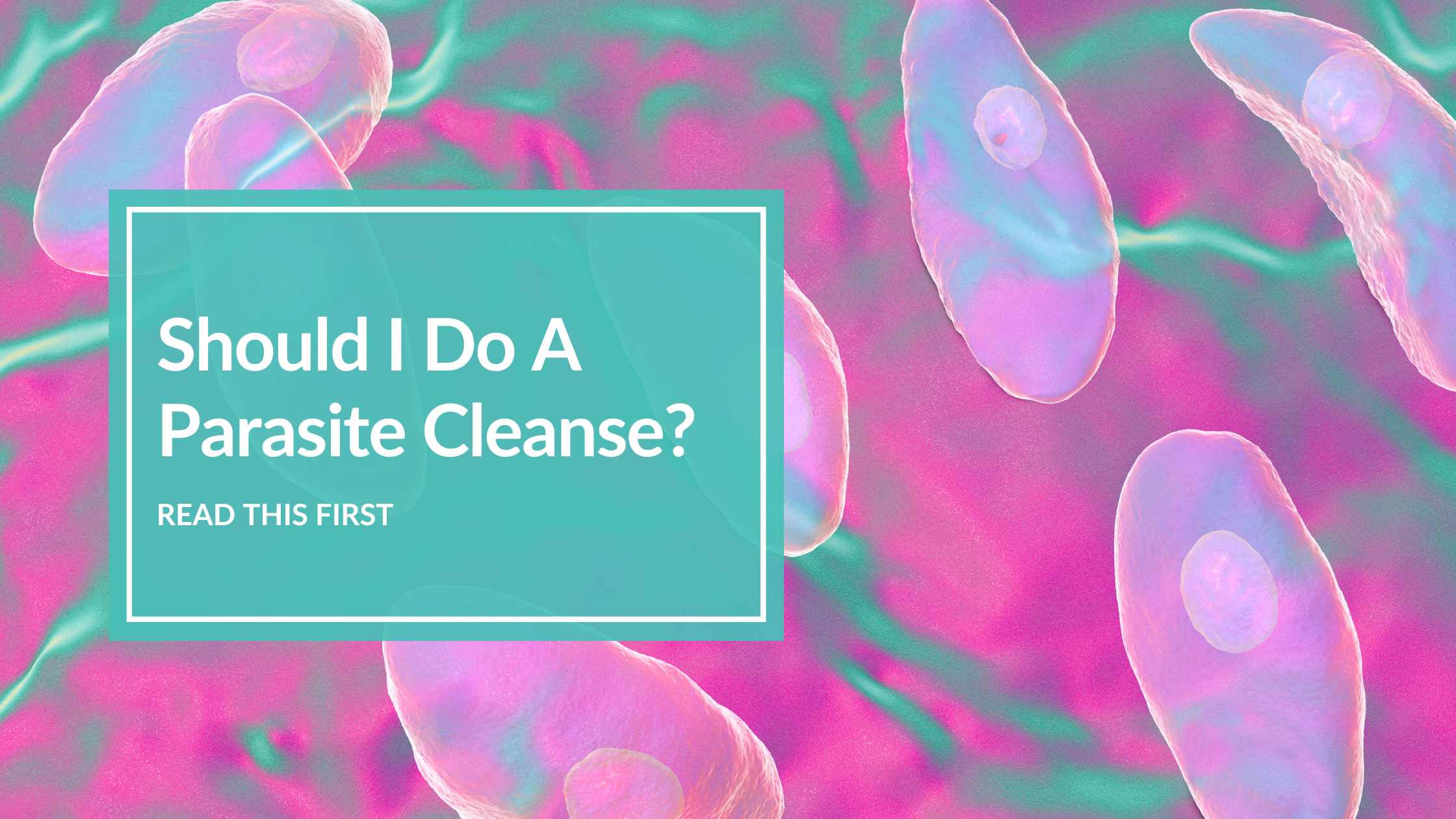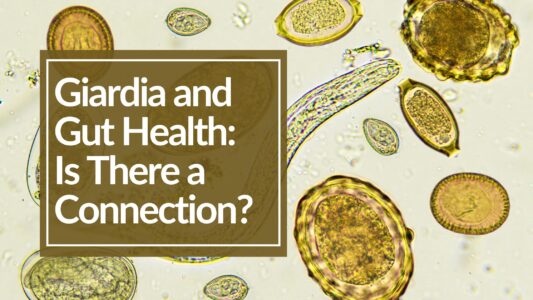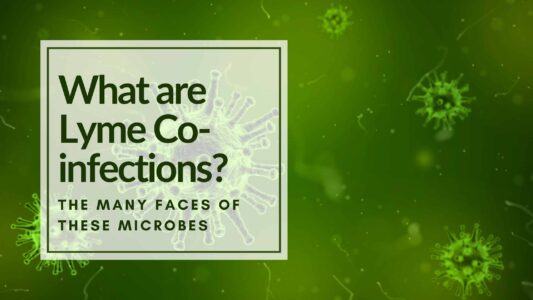
Has social media prompted you to think you should do a parasite cleanse?

If you’ve been anywhere online in the last year, you have probably seen so many “tips” and products telling you how to do a parasite cleanse. Parasite cleansing “trends” may have already peaked a year ago on TikTok, with the #parasitecleanse showing up in 885 million views at the time this article was written.
Here at CBH Energetics, parasite cleansing is not a trend, and we don’t think everyone should do a parasite cleanse.
This article will explain why and help you decide if parasite cleansing is right for you. Before you decide to do a parasite cleansing, let’s explore what these critters actually are.
Before You Do a Parasite Cleanse, Learn About Them!
Parasites – even the word itself can cause a sense of unease. But what are parasites exactly? Technically speaking, parasites are organisms that live on or in a host organism and get their food from (or at the expense of) their host.
There are three main classes of parasites that can cause disease in humans:
- Protozoa
- Helminths
- Ectoparasites
Parasites are not a disease, but they can spread diseases. Conversely, we have been living with parasites for eons. Are they good? Are they bad? They actually seem bad since everyone seems to want to do a parasite cleanse. Different parasites have different effects, even on different people! Parasites live within the intestines of mammals, including humans. They can be part of your microbiome.
They can also live in other areas of the body, such as the Blood System or parts of the stomach. Some parasites are microscopic, meaning they cannot be seen by the naked eye. Others, like bigger tapeworms, can grow quite large.
The presence of a parasite in any organism can cause a variety of symptoms. Some parasites may weaken their host, causing the host’s body to work harder to survive. This can lead to malnutrition, fatigue, and a variety of other symptoms. Some parasites exacerbate other conditions just by their presence, while other parasites may live in balance within our bodies.
Parasites are not limited to humans; they live in and on animals and can hide in cells as well. Some, like Babesia microti, have different hosts, but lay in waiting until the appropriate host is introduced into its life cycle.
It’s microbes like Babesia that started CBH Energetics over 11 years ago. It’s safe to say that we knew about parasite cleansing long before the TikTok influencers did. Read: Living with Chronic Lyme Disease, our Founder’s story, all about her quest and search for creating balanced health.
The life cycle of a parasite involves several stages, each of which may occur in a different host or environment. This complex life cycle allows parasites to spread between hosts and survive harsh conditions. The life cycle of a parasite typically involves a series of changes in structure and function, allowing it to adapt to different environments and different hosts.
They are pretty darn smart.
This is the amazing trait of a parasite, along with many other microbes. With the ability to adapt to changing temperatures, acidity, and environments, it’s no wonder that these critters have been tagging on and surviving in humans since they started migrating around the earth.
Parasites often start their life as eggs or larvae in the environment. When a suitable host comes into contact with the eggs or larvae, they can become infected. Once inside a host, parasites can grow and reproduce, producing more eggs or larvae that are released back into the environment to infect other hosts.
The length of a parasite’s life cycle can vary greatly, from just a few weeks to several years. Some parasites can even lay dormant in a host for years before becoming active and causing issues.
Before you do a Parasite Cleanse, Know That Different Cleanses Target Different Parasites.
There are many different types of parasites, each with its own unique characteristics. Some parasites, like the malaria parasite, are microscopic and can’t be seen with the naked eye. Others, like tapeworms, can grow to be several feet long. Here are some examples:
Protozoa:
Protozoa are single-celled organisms that are usually microscopic. Most protozoa living in humans are in the intestine, but they can also live in the blood or tissue. Protozoa infection can cause a variety of symptoms, from mild discomfort to severe illness. These common resonating parasites are noted as the most common in humans (1):
- Giardia intestinalis: causing giardiasis
- Entamoeba histolytica: causing amoebiasis
- Cyclospora cayetanenensis: causing cyclosporiasis
- Cryptosporidium spp.: causing cryptosporidiosis
Some protozoa can live in humans and animals, and giardia is a great example of this, although the CDC notes that the species is different (2). Cryptosporidium is another protozoan parasite that is in animals and humans and can evade the effects of chlorine in water. It is noted as “the most common waterborne disease of the United States” (3). Giardia is a common resonating parasite that affects the Digestive System of humans and pets. Read more in our blog about giardia and gut health!
Helminths:
Helminth is a general term for a parasitic worm that includes Platyhelminthes/flatworms (flukes and tapeworms) and Nematodes or roundworms. These are some other common parasites. Flatworms have a body just as described, flattened and coated in a plasma membrane. Nematodes or roundworms are cylindrical, and they have an outer cuticle (4). Helminths are considered larger, greater than 1 mm, and are well-developed with organ systems.
They may be visible to the naked eye when they are adults. They include worms such as tapeworms and pinworms. The adult worms live in the intestines and other organs. Smaller forms, such as eggs and larvae, can live in the soil and can infect people when they enter the body.
Common resonating helminths include:
- Ascaris
- Taenia
- Schistosoma
- Echinococcus
- Toxocara
While we think of parasites being transmitted through feces, species like Ascaris can also be transmitted through soil and even on vegetables and fruit not washed carefully and peeled (5).
Ectoparasites:
Ectoparasites are organisms that live on the skin but do not infect the body. They include fleas, lice, mites, and ticks. These parasites can cause a variety of skin irritations, and they can also carry destructive organisms that can be transmitted to humans. Most notable is Lyme Disease, which is transmitted through insects, most notably a tick, and is caused by the bacteria Borrelia burgdorferi.
We note Lyme here, not as a parasitic infection directly, but because it can be transmitted through an ectoparasite like a tick, which is a very common human and pet parasite. Lyme Disease is a complex condition and topic. You cannot discuss Lyme disease without discussing Lyme co-infections, either.
Babesia is considered a co-infection of Lyme, as it is a parasite that is passed through a tick, and it invades red blood cells in humans and pets. The pet parasite is Babesia canis. If you are unfamiliar with Lyne co-infections read more on our “What are Lyme Co-infections?” post.
Tick Fact: ticks secrete substances in their saliva that numb the host skin and help deter the immune system, from first bite.
Should I Do a Parasite Cleanse if I Suspect I Have Lyme?
Not exactly. There are many things to consider first. This includes your drainage pathways and even emotional stress. This situation may need some specific supports and regimens, like our Series Symptom Relief kits.
Ticks are not the only insects to think about. Fleas are noted for transmitting Tularemia and Rickettsia Typhi.
Before You Do a Parasite Cleanse, Pay Attention to Where Parasites Live
Parasites can live in a variety of environments. Some parasites prefer the warm, moist environment of the intestines or other body tissues. Others prefer the cooler environment of the skin or the hair. These are both part of the Integumentary System. Some parasites can live in the soil or water, waiting for a host to come into contact with them.
Some parasites, like heartworm, are spread from animal to animal through the bite of an infected mosquito. Other parasites, like tapeworms, can be spread to humans by eating undercooked meat from an infected animal.
Understanding where parasites live can help in preventing them in the first place. For example, knowing that a parasite is spread through water can encourage people to drink only clean, filtered water. Knowing that a parasite is spread through undercooked meat can encourage people to cook their meat thoroughly.

Understand the Biology Before You Do a Parasite Cleanse.
Parasites really are fascinating organisms from a biological perspective. They have evolved a variety of complex and sophisticated mechanisms to infect their hosts, survive within their hosts, and spread to new hosts. Parasites have a variety of ways to evade the immune system of their host.
In our practitioner course in bioenergetics, we share that the Borrelia bacteria morph into different shapes, which helps them change in response to the environment inside the host. They shift when the conditions are in their favor.
You see, the challenge with parasites is that they can change their surface proteins, effectively changing their appearance so they can hide from the host’s Immune System. Other parasites can suppress the host’s immune response, making it harder for the host to fight off the infection.
Malaria parasites have complex life cycles that involve multiple stages of development; each adapted to a different environment or host. Other parasites, like tapeworms, have evolved structures that allow them to attach securely to the walls of the intestines and absorb nutrients from their host.
Parasites can affect their hosts in a variety of ways. Some parasites cause relatively minor symptoms, like an itchy rash or mild diarrhea. Other parasites can cause severe illness and even death. Hosts can be affected directly and indirectly.
Direct consequences include damaging tissues or interfering with bodily functions. For example, some parasites can burrow into the skin, causing irritation and inflammation. Other parasites can block the intestines, preventing the absorption of nutrients.
Indirect consequences include triggering an immune response. In some cases, this immune response can cause more harm than the parasite itself. For example, in the case of malaria, the symptoms of the disease are actually caused by the body’s immune response to the parasite.

With All of This, It Sounds Like Everyone Should Do a Parasite Cleanse.
It certainly does. This practice may do more harm than good, regardless of what your favorite TikTok-er says.
Parasite cleansing is not for you if you are:
- Nutritionally depleted.
- Pregnant.
- Nursing.
- Compromised in other ways.
- On certain medications.
- Not going to the bathroom properly. This is critical!
4 Things to Think About Before You Think of Doing a Parasite Cleanse
How well are you pooping?
For general health and for the elimination of any type of toxin, you need to go to the bathroom properly. You should be having a well formed stool at least once per day, without constipation or diarrhea. This is part of opening your body’s drainage pathways, which is needed before any type of detoxification regimen can begin.
Think about this. Like other parts of your microbiome, parasites have a life cycle. They die off. Your body has to eliminate that die-off. If your bowel movements are not optimal, where will this waste go? It will sit and possibly be reabsorbed, or it will ferment or even become a neurotoxin! And you will not feel so great. For your overall health, AND if you want to do a parasite cleanse, make sure this part of your elimination pathway is open and working well!

How nourished are you?
Many of us in this modern world are stressed and struggle to get enough basic nutrients for a few reasons. One, there can be limited time to prep whole foods at home, with a busy schedule, and you may be relying on faster and less nutrient-dense meal options. Two, stress can change digestion and absorption. If your body is depleted going into a parasite cleanses, you may feel worse while going through it.
Having enough fiber is important to open up your Digestive System as the end point of your drainage pathways. Fiber mixes with bile and binds toxins for elimination. It also creates a proper stool to make sure elimination is optimal.
How hydrated are you?
It sounds so simple, but like the topic of foundational nutrients, many of us are not drinking enough water for our bodies’ basic elimination pathways to work optimally. Your liver, pancreas, kidneys, and digestive system rely on water for digestion and elimination. Some people with chronic illness and mold exposure have trouble with hydration. They can’t keep enough water in. This is where testing helps to identify any bioenergetic imbalances with cellular metabolism or minerals.
Why do you think you have parasites?
This is a serious question.
- Are you concerned with alternating constipation and diarrhea?
- Are you finding yourself sensitive to more and more foods?
- Have you traveled, and things don’t seem right since?
- Have you had a recent bug bite?
- Do you have skin rashes?
- Do you struggle with a variety of hormonal imbalances?
Remember how we mentioned that parasites (all organisms, really) know how to change according to their environment? Introducing herbal remedies without any guidance may force the parasites to morph and “hide.” Each herb or plant has different properties that act on different organ systems. Each herb also has a different microbial target.
If you purchase a cleanse online without guidance, how do you know you’re getting the right herbs?
This is where bioresonance testing shines.
CBH Energetic uses bioresonance scanning to analyze your hair and saliva for resonating toxins like parasites. You might take a Full Scan and not have any parasites show up in the scan data! This may mean, from a bioenergetic perspective, that your body is not ready for that yet.
Top Takeaways If You Want to Do a Parasite Cleanse
Before we leave you, know that just like preventing tick bites, you can try to prevent parasite infections.
- Avoiding regular sushi meals, undercooked meat, and washing your hands are simple ways to try to avoid parasites.
- Drink bottled water when traveling. We don’t love plastic bottles, but we love parasite infections even less!
- Making sure you have optimal bile flow and stomach acid is also very important. You don’t want to make a happy and hospitable environment in your gut for parasites or any microbe to overgrow and move into the small intestine.
Deciding to do a parasite cleanse is just step one. Depending on the type of parasites or your overall drainage pathways, you may have a shorter or longer regimen.
It’s also important to seek help from a licensed healthcare practitioner if you do suspect any issue with your health.
Understanding what parasites are and all that entails if you do a parasite cleanse is not just a matter of scientific curiosity. It is important for creating balanced health in all your organ systems. There is much debate about the existence of parasites in developed countries and urban communities. Much of the data points to tropical climates and unsanitary conditions as the main cause of parasitic infections.
Yet we see many clients who have struggled with parasites despite traveling. CBH Energetics has supported many clients in finding out whether or not they they resonate in needing to do a parasite cleanse with bioresonance testing for over 11 years through our Full Scan experience.
Got questions? Please contact us at info@cbhenergetics.com!
DISCLAIMER: Balanced Health, LLC/CBH Energetics and any parent, subsidiary, affiliated or related entities and companies do not provide medical advice or services. The bioenergetic products and services offered by Balanced Health, LLC/CBH Energetics including, but not limited to, bioenergetic tests, bioenergetic scans, bioenergetic reports and related products and services (collectively the “Bioenergetic Products and Services”) are designed for educational and informational purposes only and are not intended to diagnose, treat, cure, or prevent any disease, condition, complaint, illness or medical condition and are not a substitute for professional services or medical advice. Testing is not used for the purpose of obtaining information for the diagnosis, prevention, or treatment of disease or the assessment of a health condition or for identification purposes. Seek the advice of a physician or other qualified healthcare professional with any questions you may have. Never disregard professional medical advice or delay seeking treatment. These statements have not been evaluated by the Food and Drug Administration (FDA) or any other government agencies or regulatory authorities.



